The planning for his defection took two years of secret meetings with the Capitals Director of Player Personnel Jack Button, with clandestine meetings in Canada, Austria, the Soviet Union, West Germany, Finland and Sweden as well as two other European countries.
"Pivoňka has always indicated from our very first discussion that he would like to play in the best league in the world, and he felt that was the National Hockey League," said Button. Asked how Czechoslovakia reacted to the defection, Button said: "We haven't talked to them, and they haven't talked to us - and I don't expect them to, either."
ow a member of the Capitals, Pivoňka joined a roster completely devoid of any other Europeans whatsoever. While getting used to an entirely new culture, language, style of play, freedom and cash in pocket, he had a fine rookie season, scoring 18 goals and 43 points playing a longer season than he had ever been subjected to before. The Capitals then qualified for the playoffs, adding another 7 games to Pivoňka's tally for the season.
He regressed during his second season, with just 11 goals and 34 points, but improved on his overall game with a +1 rating, 20 points better than his -19 as a rookie. During the playoffs, Pivoňka found his game with 13 points in 14 games.
His offensive struggles returned in 1988-89, which earned him a trip down to the AHL for 31 games with the Baltimore Skipjacks, where he regained his confidence with 36 points in 31 games. Back with Washington, he finished the season with just 8 goals and 27 points in 52 games.
One aspect of the NHL style he had to become accustomed to was the fighting. "When the fight starts, you have to be there," Pivoňka said. "You don't have time to think whether this is the kind of hockey you're used to. You have to show up. But you don't have to fight. Just be there to hold your guy." Told that his wife Renata worries he'll get hurt, Pivoňka smiled. "She's my wife," he says. "I'm not a fighter, but I'm learning to play the hockey that's here. You say it's not my style? Why not? I'm here now. It should be my style. It's the hockey you play here."
Not wanting a repeat of his previous season, he established a career high with 25 goals and added 39 assists for 64 points.It had now been four years since his defection, but the political landscape changed enough to allow Pivoňka an opportunity to return home. "Sure I'm excited," he said. "I want to see my family. I want to go and visit some friends from school, places I haven't seen in four years."
A second 20 goal season followed in 1990-91 while his assist total rose to 50 for a new career best 70 points. The change in the politics of Eastern Europe saw new teammates arrive in the form of Peter Bondra of Czechoslovakia, Dimitri Khristich and Mikhail Tatarinov of the Soviet Union, who benefitted from Pivoňka's experience in adapting to life in the United States.
For the first time since his secret departure from Czechoslovakia, he once again had the chance to don the sweater of his national team for the first time in over five years when he was chosen to play in the final Canada Cup tournament in 1991.
Pivoňka then recorded the finest season of his career to date in 1991-92 when he scored 23 goals and set up 57 more for an 80 point season to lead the Capitals in scoring for the first time.
His fourth consecutive 20 goal season followed with 21 goals and 74 points in only 69 games. While he played all 82 games in 1993-94, he was limited to 50 points, but responded with his best postseason, scoring career bests with 4 goals and 8 points in 7 games.
After playing in Austria at the beginning of the strike shortened 1994-95 season, both Pivoňka and Bondra, who shared the same agent, held out at the start of the 1995-96 season in hopes of a raise in pay. When negotiations look longer than hoped, both players signed with the Detroit Vipers of the IHL for seven games until coming to terms with the Capitals. Pivoňka justified his pay raise with a career best 81 points to lead the team in scoring for the second time while playing on a line with Bondra.
His contract had now expired and, after averaging 41 games and 14 points in his previous three seasons, he was not resigned and, in an effort to continue his career signed a free agent contract with the Kansas City Blades of the IHL, where in 52 games, he scored 50 points before retiring as a player.
At the time of his leaving the Capitals, Pivoňka was second on the Capitals all-time scoring list with 599 points, which he amassed through 181 goals and 418 assists, which is still first all-time in franchise history over a decade later.
Today's featured jersey is a 1992-93 Washington Capitals Michal Pivoňka jersey. While many may assume the Capitals jerseys remained the same during he era of their first jerseys, there were subtle detail changes, which included adding names to the back of the red road jerseys in 1977, changing to single color names beginning in 1979-80, dropping the number of stars on the arms to just four for 1983-84 and 1984-85, adding the fifth star on the arms back in 1985-86 and making the names two colors again in 1987-88 through the end of the lifespan of this classic jersey style until it was replaced with an entirely new identity package consisting of a new logo and all new team colors in 1995-96.
Sometimes as a professional athlete you are forced to participate in things you would never, ever do willingly on your own in a million years. This is one of those times.

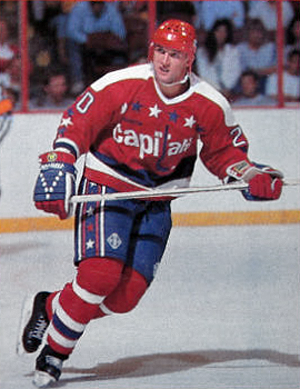
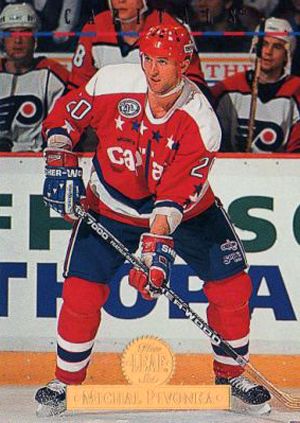
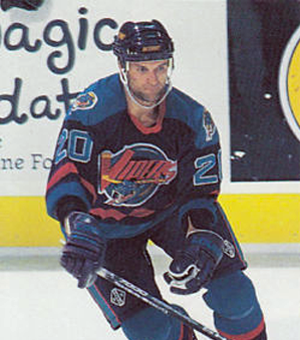
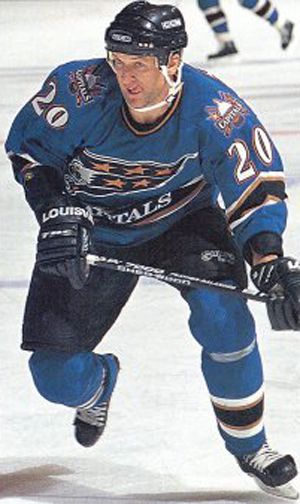
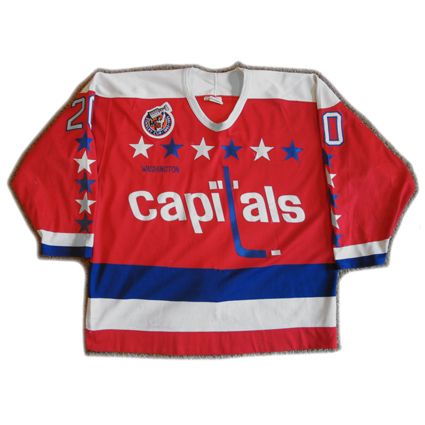
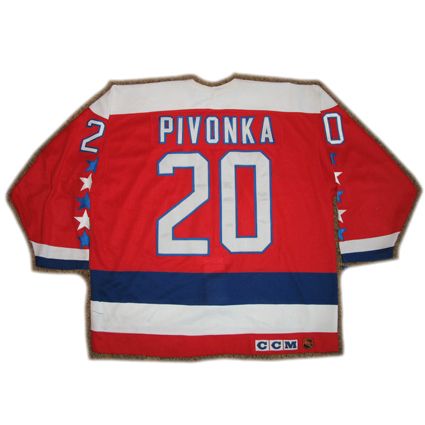










No comments:
Post a Comment
We welcome and encourage genuine comments and corrections from our readers. Please no spam. It will not be approved and never seen.